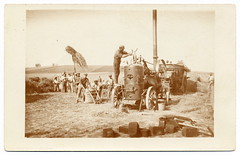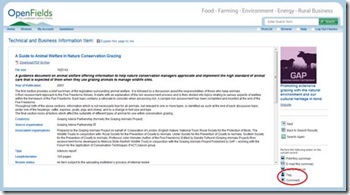Two years ago, Andy Powell (then of Eduserv) produced a thought-provoking presentation "
Web 2.0 and repositories - have we got our repository architecture right?" at a Talis event. He asked:
* where are we now? ; * what's wrong with where we are now? * what can we do about it? * do we need a new vision?
Two years on, and with the digital doors of the OpenFields library open, I find myself asking these new questions:
What can we learn about the future sustainability of digital repositories from the models evolved by physical repositories?
Are there some potential digital exemplars to monitor?

How about the word "
repository"? It seems ironic that our nearby real repository,
Blowers Repository, in Shrewsbury, is located somewhere between the library and the museum. Indeed, it's an archive. It's not a library, and it's not a museum, but it shares some of the attributes of both.
Maybe the word "
repository" does itself no favours. We think of a repository being
somewhere you stash stuff away very safely... for preservation... so you know exactly where it is... but don't need to visit it too often...
Maybe it's no surprise about what the word "
repository"
rhymes with? A place where the sun don't shine.
So, why might anyone bother to visit a repository?

Well, recently, the Victoria & Albert Museum asked itself just that, and in the interests of 'widening participation' came up with this ingenious slogan:
I'm sure the V&A has lost none of its gravitas - it took a risk and gained some street cred.
A while back, thanks to some
NOF funding, Blowers Repository had a bit of a digital airing -and you can now see some of its content through the
Secret Shropshire website. This is one of the
Digital Midlands 'Sense of Place' projects. Take a look. I think you'll find that they are really all repositories... but they don't feel like repositories....
Cast an eye through the rationale behind
Digital Ladywood for example, and you'll see there's a strong sense that this is actually more about
community and
communication than about preservation. Ladywood is a
notably deprived area of Birmingham - sporting this active community-focused resource - no elitist showcase here! And they aren't alone. Take a journey through the rich diversity that is there for all to see in
NewhamStory.com, and it's soon clear that these are something more than just archives gathering digital dust. They are living social spaces...

When Mrs Pitt-Rivers told Augustus Henry Lane Fox Pitt-Rivers that his shed simply wasn't big enough for all his accumulated stuff, I wonder if she knew what an
eclectic resource this was to become? Who is it aimed at? Researchers? Historians? Tourists? Children? Well... its audience must be as wide as its collections are eclectic.

We seem to have had a habit in the academic repository world of being driven by supply. If we happen to have 13,000 images of farmers and stockbreeders from 1920 to 1965 in a digital box under our virtual bed, we're pleased to make that visible... and laudable it is, too.
Is this what's actually in demand? If our repositories are spaces for our communities, how much are our doors open to community contribution? Who, in fact, are the experts?
In
OpenFields, we've taken the apparently uncommon step of combining 'three libraries in one'... "Technical and Business Information" is pragmatic, practitioner-focussed material that's straightforward to digest and has a clear commercial relevance. "Research Papers and Abstracts" are the peer-reviewed outcomes of academic research projects - (and academics do have a habit of writing mostly for other fellow academics.) "Open Learning Materials" are more about guiding the learner to grasp techniques, skills and concepts. Each are constructed in rather different styles, and therefore catalogued in rather different ways. Yet it's entirely possible that a user browsing the OpenFields collections may be open to

exploring more than one type of knowledge asset.
Maybe academia need not just be a provider of knowledge, but can also be a facilitator of knowledge... sourced from a wide community of experts? OpenFields is arguably, therefore, a foundation for communities of practice.
This isn't about preservation and posterity - it's about community and continuity. And maybe we can all be experts in some way?
 How about the word "repository"? It seems ironic that our nearby real repository,
How about the word "repository"? It seems ironic that our nearby real repository, 





